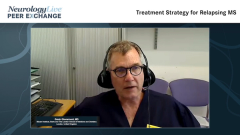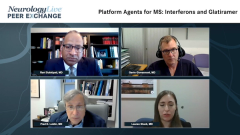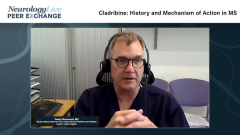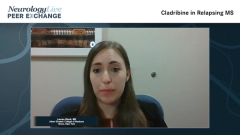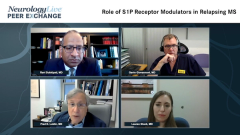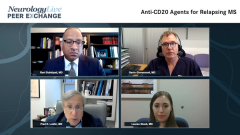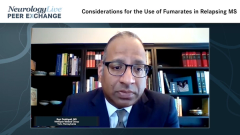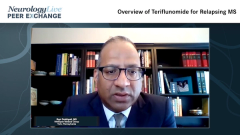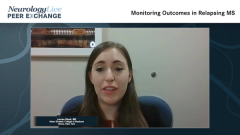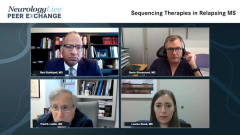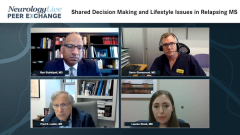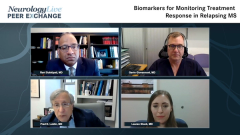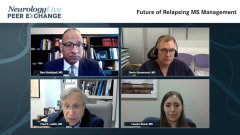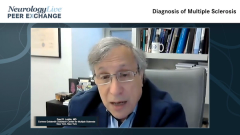
Future of Relapsing MS Management
Key opinion leaders in multiple sclerosis (MS) discuss the future of relapsing MS management and unmet needs.
Episodes in this series

Fred D. Lublin, MD: Let’s look to the future. I’m going to kick this off, as to what we would like, and I think Gavin’s comment gave me the lead-in to this. That is to find markers of individual response because all of the agents we talked about worked. Each one got approved because there was a population of patients who did well on it and continue to do well on it. What we need is individual biomarkers, individual measures of response, and it may be something like neurofilament light, or it may be something else. We shouldn’t do more frequent MRIs because I don’t think that’s practical, but something liquid certainly would help that. Also, this idea of looking at when to do individual dosing decisions.
We’ve had 2 different conversations about anti-CD20 [monoclonal antibodies]. Gavin said maybe we can wait until B cells start to come back, or more importantly, when memory B cells start to come back, because having naive B cells come back may be a good thing rather than a bad thing. But on the other hand, you also mentioned that maybe we’re not dosing enough. We’re taking the patient down to 0 in terms of the periphery, but maybe there’s more important dosing going on, maybe within the central nervous system, which you alluded to Gavin. Although, trying to treat directly within the central nervous system with anti-CD20 agent rituximab wasn’t a very effective strategy. I think the future, to me, is looking at what we can do individually with our patients to better rationalize our therapies. Now I’ll throw it around to each of you. Let me turn it to you, Lauren. What do you see for the future?
Lauren Gluck, MD: I agree. I think we’ll continue with individualized therapy plans for patients, and hopefully get better clinical- and research-based data points to guide us toward sequencing drugs better. I think one of the big questions that Gavin has brought up several times is, what do we do about all of the people who we started on ocrelizumab? We’re reaching the 5-year mark of it being FDA approved. At the 5-year point, do we de-escalate? How do we consider the long-term infection, and eventually, malignancy concerns? That’s something I’m looking forward to and am starting to precounsel patients about.
Fred D. Lublin, MD: Ravi, the future?
Ravi Dukkipati, MD: I agree with Dr Gluck. I don’t have anything further to add.
Fred D. Lublin, MD: Gavin?
Gavin Giovannoni, MD: Yes, I think we need to do an induction maintenance trial. Fred, I would love to discuss trial design there because it’s quite complicated. It’s not easy to work out how to assess maintenance therapy after saying anti-CD20 therapy is effective or not. I think we’re going to have to go into that smoldering MS [multiple sclerosis] component, so this would be add-on treatments. What can we add to an existing platform, bottom of the pyramid, anti-inflammatory medication to protect damaged axons from dying, to remyelinate them, to promote repair? That’s the sandwich we have to build up, and it’s going to be a nightmare in terms of trial design. That’s where our big challenge is. Then you alluded to it, those other things. One of the components of progressive MS is premature aging. How do we push back aging mechanisms to optimize the brain health of our patients when they get older? Is there anything we can do? One of the things I’ve begun to realize, which we haven’t discussed, is the elephant in the room: poor sleep. Our patients with MS have a whole lot of reasons why they don’t sleep properly…. We don’t address the sleep disorders in our patients with MS. It’s looking after all the small, little things, they all add up. This is what I call a minimal gains hypothesis. If we can focus on those little things that make MS worse, overall they’ll add up, and we can hopefully make a big difference for our patients. There’s a lot of work to still be done.
Fred D. Lublin, MD: Yes, especially in progressive disease. Ravi, this is important. Advice for community physicians?
Ravi Dukkipati, MD: I think if I had to give 1 piece of advice to community physicians, it would be that we now have upward of 20 different DMTs [disease-modifying therapies] on the market, and rather than getting overwhelmed, the key is to be aware of the key classes and familiarize yourself with, perhaps, only 1 or 2 of each. Know those, let’s say 4 or 5 drugs, well and don’t get bogged down by choosing from 20. Also, don’t forget about resources. I often will get second opinions in particularly difficult cases.
Fred D. Lublin, MD: Well, this has been a great discussion, and I thank you Dr Gluck, Dr Dukkipati, and Dr Giovannoni for your contributions. I’ve enjoyed listening to your views.
Thank you all for watching this NeurologyLive® Peer Exchange. If you enjoyed the content, please subscribe to our e-newsletters to receive upcoming Peer Exchanges and other great content right in your inbox. Thank you for joining us.
Transcript Edited for Clarity
Newsletter
Keep your finger on the pulse of neurology—subscribe to NeurologyLive for expert interviews, new data, and breakthrough treatment updates.

